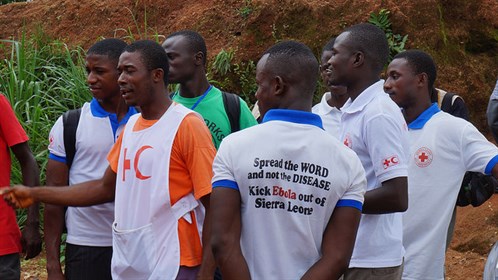
By Kate Hawkins
The recent call for more of a focus on people centred health systems and the devastating effects of Ebola in West Africa have brought communities to the forefront of the attention of decision makers. REACHOUT, along with our sister consortia ReBUILD and COUNTDOWN, are part of a growing group of health systems researchers who are trying to provide guidance to those grappling with health systems strengthening in Ebola-affected countries. Most recently we have provided written evidence to the UK All Party Parliamentary Group on Africa under their call for inputs on community-led health systems and Ebola.
Why focus on communities?
Communities play a largely unrecognised, unrewarded and unsupported role in health systems around the world. There are many families and community structures (such as local governments and schools) which perform tasks which are central to good health. Yet they are rarely factored into health system planning and their views tend not to influence policy and practice in this area.
Close-to-community providers of health care (such as community health workers (CHWs)) live and work within their communities, visiting people in their homes and workplaces every day, they can have a vital role in informing realistic healthcare policies that deliver results at community level. However even when their health promotion and delivery activities are recognised, for example in some CHW initiatives, they are often working in sub-optimal circumstances and are poorly linked to, and managed by formal health programmes. This has led to a disconnect between healthcare policy and the workers delivering healthcare services directly to individuals, families, and communities. This disconnect has resulted in loss of motivation and problems with health worker retention and ultimately an additional disconnect between service users in the community and health facilities resulting in a decrease in service utilisation. In Ebola-affected countries this is exacerbated by poor infrastructure, inadequate skilled health workforce which was further depleted by loss of health care workers to the illness, health systems which were already struggling and unresponsive in a post-conflict context, and Ebola-stigma against front-line workers.
Our submission to the enquiry in a nutshell
- Community structures and close-to-community providers of health care have the potential to improve health system functioning and health outcomes in Ebola-affected countries and beyond. They are vital to rebuilding trust between communities and health systems. Yet their (potential) role and responsibilities are poorly understood and supported. There is an urgent need to gather more information which can better integrate their work into the larger health system. This is a body of research that the UK Government should support.
- There is much that we can learn from the response to Ebola. Yet platforms and information sharing mechanisms are inadequate. The UK Government could play a key role in financing multi-stakeholder platforms to this end.
- Community-level health work is reliant on the robustness of the overall health system. In Ebola-effected countries (which were also post-conflict settings) the overall system had critical weaknesses. Efforts to strengthen the whole system under the leadership of national government are sorely needed.
- The lack of appropriately trained, remunerated, and incentivised health workers is of particular concern to Ebola-affected countries.
- Improving health needs to be a multi-sectoral endeavour. Infrastructure, telecommunications networks, and roads as well as urban regeneration are also important to the response.
- A body of evidence on both community action on health and system strengthening post-conflict and crisis already exist and should not be overlooked as we rebuild in the post-Ebola era.
- The UK Government develop a strategy that specifically addresses the role of communities and CHWs in supporting better health.
Photo credit: ©EC/ECHO/Cyprien Fabre https://www.flickr.com/photos/69583224@N05/14700430098
Latest news
- Implications of the community health policy change in Kenya in light of world health worker week #WHWWeek, 10 April 2015
- REACHOUT quality improvement cycle in Indonesia: Our work in pictures, 9 April 2015
- Communicating better about community health workers: Reflections on #ResUpMeetUp, 30 March 2015

This project is funded by the European Union.
